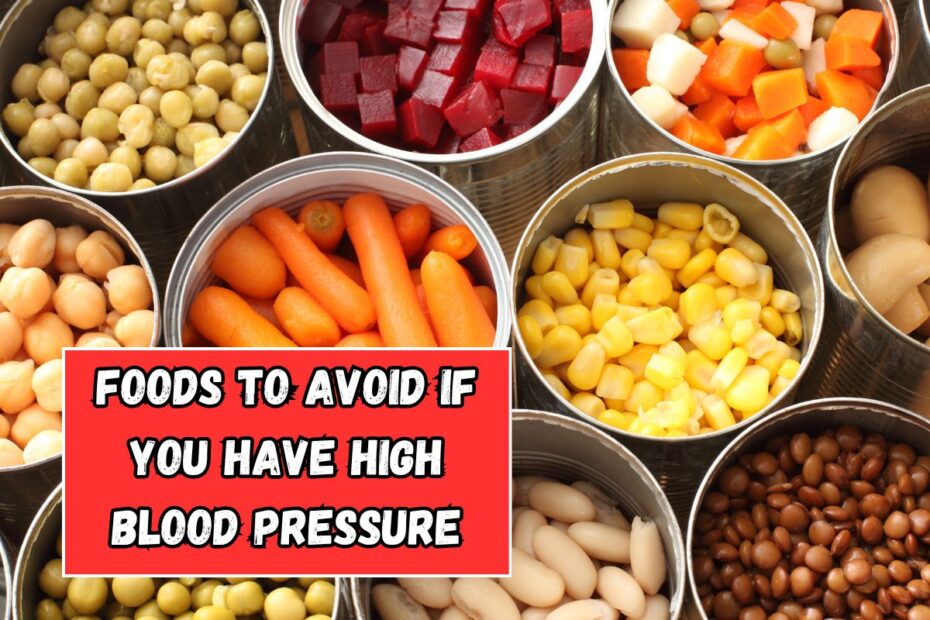Foods To Avoid if You Have High Blood Pressure:-Changing what you eat is often part of treating high blood pressure, or hypertension. Some things can make your blood pressure go up, so watching what you eat can be very important for your health.
We’ll talk about some of the most important types of foods you should avoid if you have high blood pressure and give you ideas for healthier choices.
1. Foods that are high in salt and sodium
Too much salt in the diet is one of the main causes of high blood pressure. Eating foods that are high in salt can make your body hold on to water, which can raise your blood pressure and volume.
Processed and packaged foods, like soups in a can, deli meats, and snack foods, are known to have a lot of salt.Also, diner food usually has a lot of salt because it makes the food taste better.
To keep your blood pressure in check, try to eat no more than 2,300 milligrams of sodium per day, or even better, 1,500 milligrams for even better results.
2. Fast foods and processed foods
Processed and fast foods often have a lot of calories, sodium, and fats that are bad for you. This makes them bad for people with high blood pressure.
Foods like burgers, fries, and frozen dinners often have artificial ingredients and chemicals that are bad for your heart.
Also See:-The 6 Best Healthy Habits to Help You Live Longer
Besides making you gain weight, these things can also make you more likely to get high blood pressure. When you can, choose fresh, whole foods.
You can control the ingredients and serving sizes when you cook at home, which makes it easier to stick to a heart-healthy diet.
3. Foods and drinks that are high in sugar
A lot of sugar in the diet, especially from sweet drinks and snacks, can cause metabolic syndrome and fat, both of which are linked to high blood pressure.
Sodas, fruit drinks, candies, and pastries that are high in sugar can raise insulin levels, which can lead to inflammation and higher blood pressure.
Instead of looking for sweets, try lower-calorie treats like fruits or dark chocolate in moderation. You can stay hydrated without adding extra sugar to your diet by drinking water or plant teas.
4. Dairy products and red meat that are high in fat
High-saturated-fat diets can raise cholesterol levels and make you more likely to get heart disease, both of which can make high blood pressure worse. A lot of red meat, like beef and pork, and full-fat dairy, like cheese and cream, can make this problem worse.
If you want to lower your blood pressure, you should eat lean meats, chicken, fish, and low-fat or non-fat dairy products. Including more plant-based proteins, like tofu, lentils, and beans, can also help your heart stay healthy and give you important nutrients.
5. Fine alcohol and coffee
Moderate drinking may be good for your heart, but too much drinking can make your blood pressure go up. Studies show that hypertension can happen if women drink more than one drink a day and men drink more than two drinks a day.
In the same way, caffeine can briefly raise blood pressure in some people. It’s best to keep an eye on how much you drink and, if you have to, choose decaffeinated drinks or drink booze in moderation.
Focus on drinking water and herbal teas to stay hydrated. They are good for you and don’t add calories or energy.
6. Foods that are high in calories and low in nutrients
Foods that are high in calories but low in important nutrients can make you gain weight and raise your blood pressure. Chips, sweets, and sugary cereals are examples of foods that are high in calories but not very good for you.
Instead, eat foods like fruits, veggies, whole grains, lean proteins, and fiber that are high in nutrients like vitamins, minerals, and fiber. Adding these foods to your daily diet can help you keep your weight in check and keep your heart healthy generally.
Conclusion
One important way to control high blood pressure is to stay away from certain foods.
You can take big steps toward better blood pressure control by cutting back on salt and sodium, staying away from processed and fast foods, drinking less sugar and unhealthy fats, and being more aware of the drinks you choose.
Talk to a doctor or nutritionist before starting a new diet to get personalized information and help making a plan that works for you. A healthy future is possible if people make smart food choices.
